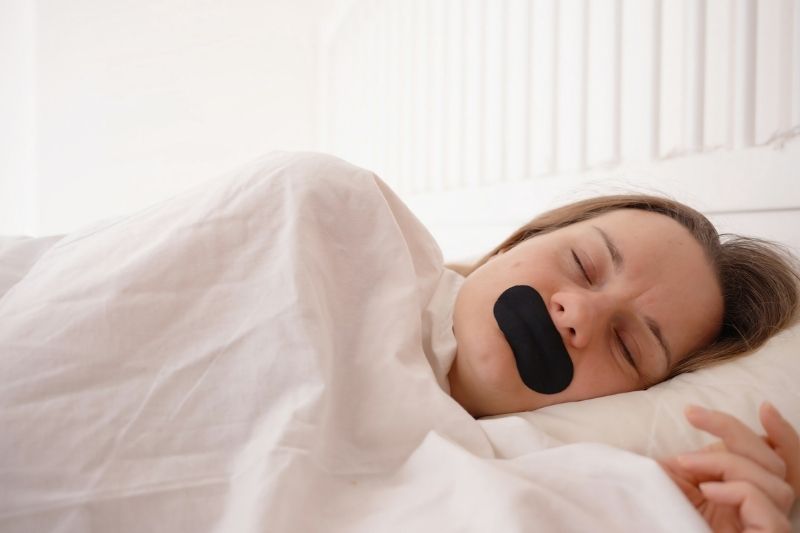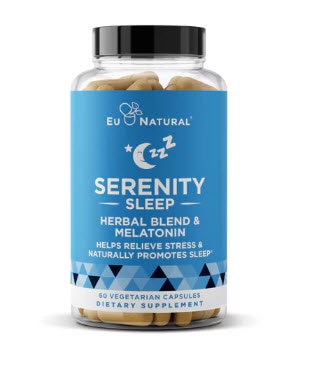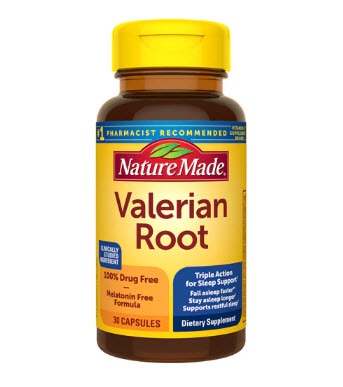Between mouth-watering recipes, funny cat videos, hair tutorials and everything in-between, social media makes it easy to lose track of time. It’s also easy to come across the never-ending stream of wellness trends, and one that’s currently taking over people’s feeds involves taping your mouth at night.
That’s right — little pieces of tape designed to seal your lips are the latest claim to Internet fame, promising better sleep, oral hygiene and more. Discover what mouth taping actually entails, why it’s captured the attention of the masses and what experts want you to know before giving it a try.
What is mouth taping?
Mouth taping is the practice of placing a piece of tape, also known as an oral patch, over part of your lips at night before you go to sleep. The idea is to prevent the mouth from hanging open while sleeping, helping to correct mouth breathing that’s out of your control. Some people have found this to help support sleep quality, oral health and more.
So, are people using scotch tape they find around the house? Not exactly. This trend involves using specialized tape designed specifically for this purpose. Mouth tape products are typically flexible so the mouth isn’t uncomfortably sealed shut, and they’re made from skin-safe materials to prevent irritation. They come in a variety of designs, but they share a common purpose of encouraging nasal breathing, which is the heart of this trend.
4 potential benefits of mouth taping
When anything racks up a certain amount of views, it’s natural to wonder whether the hype is blown out of proportion. To find out if mouth taping is actually beneficial for some people, we asked experts for their honest thoughts. Here’s what they said some people may glean from mouth taping.
1. Encourages nasal breathing
We’ve all heard jokes about “mouth breathers,” but breathing through your mouth isn’t ideal, per the Cleveland Clinic. One of the main perks of mouth tape is that it could help correct the involuntary tendency to breathe through your mouth while sleeping. So, mouth taping isn’t about the mouth at all — it’s actually about the nose, says Stephen Carstensen, DDS, a dentist who’s board certified in dental sleep medicine.
Nose breathing, or nasal breathing, is considered superior to mouth breathing for a variety of reasons. “Children’s faces depend on it to grow properly, young adults need it for healthy brain function, and adults need it to support proper lung function for a lifetime,” Dr. Carstensen explains.
Because we can’t control how we breathe when we’re sleeping, mouth tape is one possible tool to take back the reins. It helps the body shift to nasal breathing, which is the catalyst for the other possible benefits of mouth taping.
2. Reduces snoring
Nasal breathing isn’t just about proper development and bodily function, it also has to do with sleep. Let’s talk about snoring — a common condition that affects millions of people, many of whom may not even realize they do it.
People who snore don’t exactly want to be snorers, but it’s not their fault. Snoring is the byproduct of obstructed breathing, per John Hopkins Medicine. If that sounds serious, it’s because it often is. “What seems like a simple snoring issue can actually be the sign of a more serious airway condition,” says Geoffrey B. Trenkle, DO, an otolaryngologist and ENT surgeon in Los Angeles. For example, snoring could be a sign of sleep apnea, a common yet obstructive condition that can prevent you from getting deep, restful sleep and increasing your risk of disease.
By encouraging nasal breathing during sleep, mouth taping may help reduce snoring, Dr. Trenkle says. There isn’t a ton of research on this, but one small study found that oral patches reduced snoring in people with open-mouth breathing and sleep apnea.
3. Improves sleep quality
Sleep apnea often comes up in conversations surrounding mouth breathing, and it’s because the two often go hand in hand. Though sleep apnea occurs during rest, it can affect how you feel when you’re awake. People with this condition often feel drowsy, which makes sense because sleep apnea can prevent you from getting deep, restful sleep. It’s not just an energy issue — sleep apnea can put extra strain on your cardiovascular system, so it can increase your risk of heart disease and heart failure, per the American Heart Association.
Correcting mouth breathing, whether it’s linked to sleep apnea or not, could potentially help, however. “As an ENT specialist, I’ve seen a growing interest in mouth taping as a potential sleep aid,” Dr. Trenkle says. “I’ve seen patients feel more rested when they’re able to maintain nasal breathing consistently through the night.”
More research on this is needed, but one review found that mouth taping may be beneficial for snoring and sleep apnea. However, this doesn’t mean that people with sleep apnea should self-treat with mouth tape. You should still see a healthcare professional for further evaluation — more on this to come.
4. Reduces dry mouth
Though mouth taping is more about the nose than the mouth, there may be some oral benefits. Some people are drawn to mouth taping because it’s rumored to help with dry mouth, bad breath and overall dental hygiene. But is there any truth to this?
“Nose breathing keeps the mouth moist, which reduces cavities and gum disease,” says Michelle Jorgensen, DDS, a holistic dentist with a private practice in American Fork, Utah. Research has shown that mouth breathing reduces saliva production and causes drying in the mouth. One of saliva’s purposes is to flush away bacteria, and without enough of it, there may be increased risk of tooth decay and periodontal disease.
Is mouth taping safe?
Just because you see something trending online doesn’t automatically mean you should try it. Mouth tape isn’t necessarily appropriate for everyone, and it’s important to take caution.
“Mouth taping is generally safe when used correctly,” Dr. Jorgensen says. However, it’s not meant to replace treatment in those with an airway disorder. “If you have or suspect sleep apnea, hold off on the tape and head straight to a dental sleep specialist or sleep doctor,” Dr. Jorgensen advises. The first step is usually a sleep study, though there are also scans that your healthcare team can order, she says.
You also shouldn’t use mouth tape if you can’t breathe through your nose at all, Dr. Carstensen says. He recommends trying the following to assess whether you can nose-breathe comfortably: Hold your fingers to your lips and focus on breathing exclusively through your nose for around 3 minutes. If you can’t do that, it’s a sign that your nose isn’t ready and you might want to consider looking into why instead of taking matters into your hands.
Some people may breathe through their mouths due to airway conditions, and if they use mouth tape, it could do more harm than good. “If your body is defaulting to mouth breathing to compensate for restricted airflow, taping your mouth shut can worsen oxygen deprivation and lead to serious complications,” Dr. Trenkle says.
When to get evaluated
Any time you have questions about your health, it’s a good idea to check with a healthcare professional.
“Mouth taping might seem trendy, but it’s not just a TikTok fad,” Dr. Jorgensen says. “It gently nudges your body back into proper breathing mode and delivers some serious benefits.” But there’s a catch: Your body shouldn’t need tape to breathe properly. You also might need more than a little piece of tape to get the relief you’re looking for.
If you suspect you’re breathing through your mouth more often than your nose, especially during sleep, it’s best to be seen by a healthcare professional for further evaluation. There could be an underlying condition behind your mouth breathing, such as sleep apnea or an airway condition, and your healthcare team can help you get answers and come up with the right treatment plan.
Tips for using mouth tape safely
Mouth taping may be one helpful tool to get in the habit of nasal breathing, which is associated with a plethora of benefits. Experts recommend keeping the following mind:
- Do check with your healthcare provider.
- Don’t use mouth tape if you can’t breathe through your nose at all or in place of treatment.
- Do use skin-safe, medical-grade mouth tape designed for sleep.
- Don’t use standard adhesive tape, which can cause discomfort.
- Do wear the tape for a short period of time while awake to ensure comfort.
- Don’t cover the entire mouth with tape.
- Do place a short, horizontal strip on the center of the lips.




